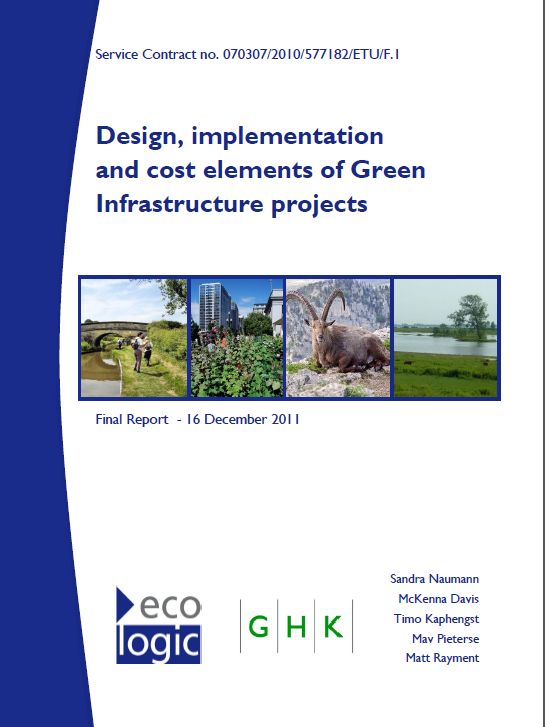Design, Implementation and Cost Elements of Green Infrastructure Projects
- Project
- Duration
-
-
Green Infrastructure has emerged as a valuable tool to enhance ecosystem resilience and to contribute to biodiversity conservation and benefit human populations. Ecologic Institute and GHK produced a comprehensive overview of the design, implementation and cost efficiency of green infrastructure projects in the EU to solidify the understanding of this concept. The results of this research were presented at the workshop "Insights from Green Infrastructure projects in the EU", held in Brussels on 17 January 2012. Given the cross-sectoral nature and relevance of the subject, attendees included representatives from DG Environment, DG Clima and DG Regio, amongst others. The study will contribute to the EU’s post-2010 biodiversity policy and the development of the upcoming EU strategy on green infrastructure. The final report and presentation are available for download.
Background
The increasingly fragmented nature of European habitats as a result of human-induced land cover change and land use intensification necessitates the integration of biodiversity and habitat considerations into other policies and sectors (such as agriculture, forestry, water, marine and fisheries, regional and cohesion policy, climate change mitigation and adaptation, transport, energy and land use policy) in order to strengthen ecological coherence within Europe. The planned EU strategy on green infrastructure aims to address this issue and reconnect fragmented natural areas, maintain healthy ecosystems and restore damaged habitats, as well as to provide solutions to climate change adaption. Investing in and building up Green Infrastructure needs smart and integrated approaches to spatial planning to ensure that Europe's limited land is turned into areas capable of providing multiple functions for nature and society.
In the planned strategy, particular attention will be paid to strengthening the integration of green infrastructure aspects in the EU’s various funding programmes (e.g. structural and cohesion funds, CAP, LIFE+) throughout the current and future financial programming period starting in 2013.
Objectives
This project aims to support the development of an EU-wide strategy for green infrastructure as part of the EU’s post-2010 biodiversity policy by improving the understanding of green infrastructure projects in terms of their design, implementation, funding process and cost-and benefit ratios. More specifically, the project aims to identify all kinds of green infrastructure projects and measures, both in rural and urban areas in the EU, including e.g. the restoration of nature, management of floodplains, sustainable urban drainage systems or cooling systems using green spaces, improving natural water retention and purification by reforestation, wetland restoration or soil management. The study will focus on projects of EU relevance that are local/regional, national or transnational, exploring how they have been designed and promoted and looking at how planning co-ordination between actors and cross-border cooperation, if applicable, have been achieved.
Methodology
Several tasks will be involved in this study, including:
- Developing a typology for green infrastructure projects and establishing a database for said projects;
- Conducting a cost-benefit analysis of European green infrastructure projects (compared to grey infrastructure projects) and assessing their potential to respond to multiple objectives (e.g. biodiversity management and enhancement, increasing resilience to climate change, protection against disasters); and
- Analysing the potential of EU policy and available funding instruments to promote green infrastructure projects and provide for the capacities and planning needed to develop them further.
The final report [pdf, 2.5 MB, English] can also be found on the European Commission's Environmental Economics website.





